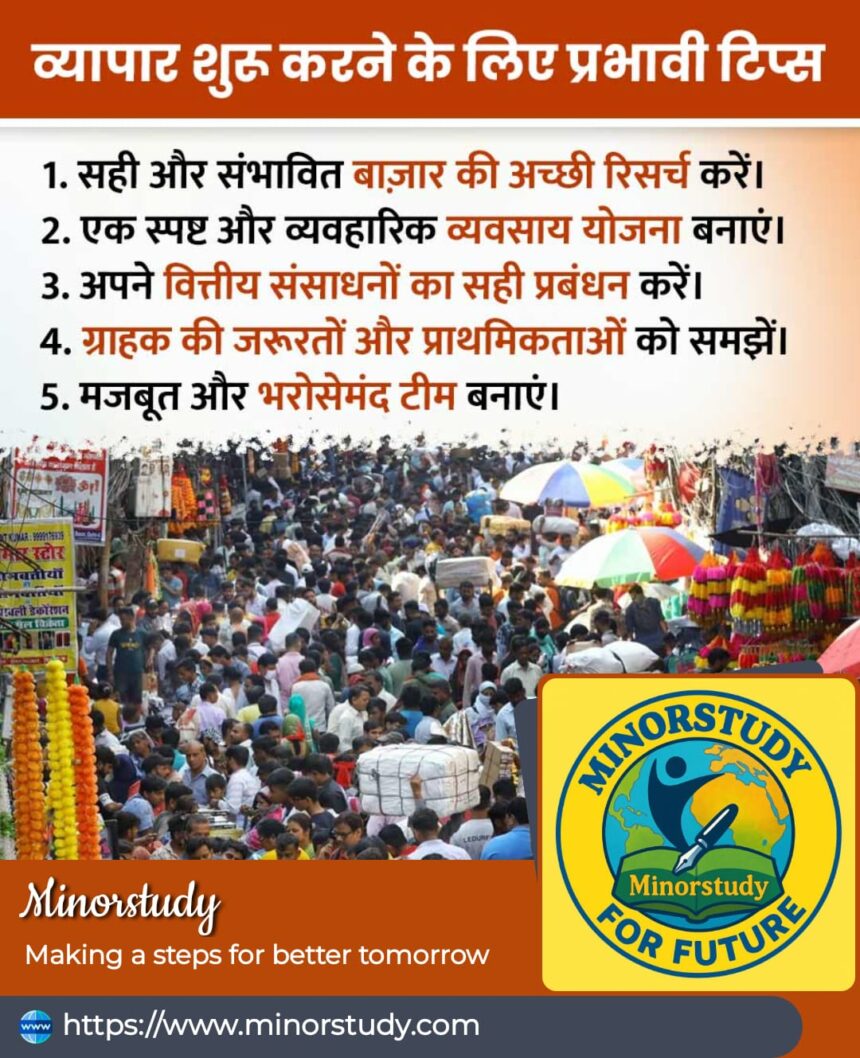🔍 Introduction: Why Smart Businesses Start with Smart Tips
In today’s competitive and constantly evolving world, starting a business is more than just registering a company or building a product. It’s about strategy, resilience, and vision. Many aspiring entrepreneurs fail not because their ideas aren’t good—but because they ignore fundamental principles in the initial stages.
- 🔍 Introduction: Why Smart Businesses Start with Smart Tips
- 🕰️ Historical Background: Evolution of Business Thinking
- ✅ 7 Game-Changing Tips to Start a Business
- 1. Do Proper Research on the Right and Potential Market
- 2. Make a Clear and Practical Business Plan
- 3. Manage Your Financial Resources Properly
- 4. Understand Customer Needs and Preferences
- 5. Build a Strong and Reliable Team
- 6. Leverage Technology Early
- 7. Stay Legally and Ethically Compliant
- 📆 Timeline: From Idea to Execution
- 📚 Interesting Facts About Starting a Business
- ❓ Frequently Asked Questions (FAQs)
- 🌟 Significance: Why These Tips Matter in Real Life
- 🎉 Wishing You Entrepreneurial Success!
- ❤️ Why It Matters to Society
- 🧠 Important Takeaways
- ✅ Conclusion: Let These Tips Guide Your First Steps
In this guide, we bring you 7 powerful and often ignored tips that can help you start a business effectively. These are not just surface-level tips but deep-rooted strategies supported by history, market data, and human behavior insights.
🕰️ Historical Background: Evolution of Business Thinking
The journey of entrepreneurship dates back thousands of years—from barter systems in ancient civilizations to merchant guilds during the Middle Ages, to the rise of modern startups today.
Ancient India & Mesopotamia (3000 BCE): Barter trade and cottage industries were early business forms.
Industrial Revolution (18th Century): Systematic businesses emerged—mass production, capitalism, and market competition began.
Modern Era (21st Century): Startups, digital economy, and global ventures define business today.
What remains constant through these periods? Understanding the market, managing resources, and adapting to change.
✅ 7 Game-Changing Tips to Start a Business
1. Do Proper Research on the Right and Potential Market
Understanding the market size, customer demographics, competitors, and gaps in the current offerings is crucial.
Use tools like Google Trends, Statista, and surveys.
Study competitors: What are they missing?
Identify market timing—is your idea early, late, or right on time?
📌 Example: Airbnb launched during the 2008 recession when people needed extra income and cheaper travel options. Perfect market timing!
2. Make a Clear and Practical Business Plan
A business plan is not just for investors—it’s your blueprint for success.
Include your mission, vision, SWOT analysis, funding needs, pricing model, and growth plan.
Keep it flexible but focused.
Revisit and revise every 6-12 months.
📌 Pro Tip: Use tools like Lean Canvas or Business Model Canvas for one-page clarity.
3. Manage Your Financial Resources Properly
Money is fuel. Mismanagement leads to failure, even if your product is great.
Keep personal and business finances separate.
Use accounting tools like Zoho Books, QuickBooks.
Have 6–12 months of runway planned.
Track ROI (Return on Investment) for every rupee spent.
📌 Fact: 82% of small businesses fail due to cash flow problems (U.S. Bank study).
4. Understand Customer Needs and Preferences
Businesses exist for customers—not just founders or investors.
Conduct customer interviews.
Track user behavior using analytics tools.
Create buyer personas.
Build feedback loops through social media or email marketing.
📌 Golden Rule: “Don’t build a product and then find customers. Find customers and build what they need.”
5. Build a Strong and Reliable Team
You can go fast alone, but far together.
Hire not just for skills but for values and culture.
Clearly define roles and responsibilities.
Foster transparency and motivation.
📌 Example: Steve Jobs credited Apple’s success to hiring “A-players” and maintaining a focused team culture.
6. Leverage Technology Early
Use tech to automate, scale, and optimize:
CRM tools (HubSpot, Zoho)
Marketing automation (Mailchimp, Buffer)
Project management (Trello, Asana)
You don’t need to be tech-savvy—just tech-aware.
7. Stay Legally and Ethically Compliant
Legal compliance is often ignored early—but ignoring it can cost you your business.
Register your company (LLP, Pvt Ltd, etc.).
File necessary taxes (GST, TDS).
Get trademarks, if needed.
Follow labor laws if hiring.
📌 Reminder: Ethics build trust. Trust builds long-term brand equity.
📆 Timeline: From Idea to Execution
| Phase | Duration | Activities |
|---|---|---|
| Ideation | 0–1 month | Market research, brainstorming, problem validation |
| Planning | 1–2 months | Business plan, MVP prototype, team building |
| Execution | 3–6 months | Product/service launch, early customer feedback |
| Stabilization | 6–12 months | Marketing push, legal, financial streamlining |
| Scaling | 1 year+ | Investment, partnerships, expansion |
📚 Interesting Facts About Starting a Business
India is the 3rd largest startup ecosystem in the world.
90% of startups fail within the first 5 years—most due to poor planning or market mismatch.
Digital businesses have 30% lower startup costs than physical ones.
Entrepreneurs who have failed once are more likely to succeed the next time.
❓ Frequently Asked Questions (FAQs)
Q1. How much capital do I need to start a business?
A: Depends on your industry. Service businesses may start with ₹50,000–₹2 lakhs, while product-based ones need ₹5–20 lakhs.
Q2. Should I quit my job to start a business?
A: Not immediately. Start as a side hustle until your income is sustainable.
Q3. Is a business plan necessary for small businesses?
A: Absolutely. Even a 1-page plan provides direction and clarity.
Q4. How do I find co-founders or team members?
A: Platforms like LinkedIn, AngelList, and even startup events or hackathons.
Q5. What legal structure is best in India?
A: Most startups begin as Private Limited Companies or LLPs for limited liability and funding flexibility.
🌟 Significance: Why These Tips Matter in Real Life
These 7 tips are not theory—they are survival tools. A startup is not just a business; it’s a test of resilience, adaptability, and vision. Without research, you fly blind. Without planning, you drift. Without a team, you burn out.
These principles ensure:
Long-term sustainability
Higher success probability
Better investor and customer trust
Less stress and fewer regrets
🎉 Wishing You Entrepreneurial Success!
May your journey as an entrepreneur be filled with clarity, courage, and creativity. Remember, every big business was once a small startup—but with consistent application of these truths, you can grow beyond limits.
🌱 “Start small, think big, scale smart.”
❤️ Why It Matters to Society
Entrepreneurship fuels:
Innovation (new solutions to age-old problems)
Employment (job creation across sectors)
Economic growth (boosting GDP and tax base)
Social impact (solving local and global issues)
Every new business has the potential to create waves of positive change. Your idea, if executed well, could solve someone’s problem, support a community, or even change the world.
🧠 Important Takeaways
Research first, act second.
Always plan—don’t wing it.
Know your customer like a best friend.
Money is your lifeline—manage it like gold.
Teamwork beats talent when talent doesn’t collaborate.
✅ Conclusion: Let These Tips Guide Your First Steps
Starting a business isn’t easy—but it’s one of the most rewarding and empowering journeys you’ll ever take. Whether you’re starting a café, launching a tech startup, or offering freelance services—these 7 game-changing tips are your startup compass.
Stick to them. Refine them. Revisit them.
And most importantly—start.








